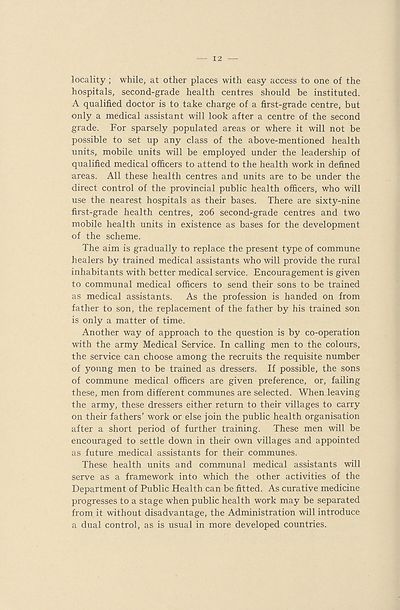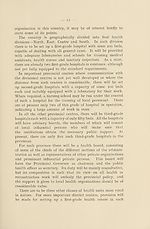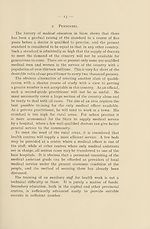Health > Intergovernmental conference of Far-Eastern countries on rural hygiene : preparatory papers : national reports : report of Siam
(14)
Download files
Complete book:
Individual page:
Thumbnail gallery: Grid view | List view

12
locality ; while, at other places with easy access to one of the
hospitals, second-grade health centres should be instituted.
A qualified doctor is to take charge of a first-grade centre, but
only a medical assistant will look after a centre of the second
grade. For sparsely populated areas or where it will not be
possible to set up any class of the above-mentioned health
units, mobile units will be employed under the leadership of
qualified medical officers to attend to the health work in defined
areas. All these health centres and units are to be under the
direct control of the provincial public health officers, who will
use the nearest hospitals as their bases. There are sixty-nine
first-grade health centres, 206 second-grade centres and two
mobile health units in existence as bases for the development
of the scheme.
The aim is gradually to replace the present type of commune
healers by trained medical assistants who will provide the rural
inhabitants with better medical service. Encouragement is given
to communal medical officers to send their sons to be trained
as medical assistants. As the profession is handed on from
father to son, the replacement of the father by his trained son
is only a matter of time.
Another way of approach to the question is by co-operation
with the army Medical Service. In calling men to the colours,
the service can choose among the recruits the requisite number
of young men to be trained as dressers. If possible, the sons
of commune medical officers are given preference, or, failing
these, men from different communes are selected. When leaving
the army, these dressers either return to their villages to carry
on their fathers’ work or else join the public health organisation
after a short period of further training. These men will be
encouraged to settle down in their own villages and appointed
as future medical assistants for their communes.
These health units and communal medical assistants will
serve as a framework into which the other activities of the
Department of Public Health can be fitted. As curative medicine
progresses to a stage when public health work may be separated
from it without disadvantage, the Administration will introduce
a dual control, as is usual in more developed countries.
locality ; while, at other places with easy access to one of the
hospitals, second-grade health centres should be instituted.
A qualified doctor is to take charge of a first-grade centre, but
only a medical assistant will look after a centre of the second
grade. For sparsely populated areas or where it will not be
possible to set up any class of the above-mentioned health
units, mobile units will be employed under the leadership of
qualified medical officers to attend to the health work in defined
areas. All these health centres and units are to be under the
direct control of the provincial public health officers, who will
use the nearest hospitals as their bases. There are sixty-nine
first-grade health centres, 206 second-grade centres and two
mobile health units in existence as bases for the development
of the scheme.
The aim is gradually to replace the present type of commune
healers by trained medical assistants who will provide the rural
inhabitants with better medical service. Encouragement is given
to communal medical officers to send their sons to be trained
as medical assistants. As the profession is handed on from
father to son, the replacement of the father by his trained son
is only a matter of time.
Another way of approach to the question is by co-operation
with the army Medical Service. In calling men to the colours,
the service can choose among the recruits the requisite number
of young men to be trained as dressers. If possible, the sons
of commune medical officers are given preference, or, failing
these, men from different communes are selected. When leaving
the army, these dressers either return to their villages to carry
on their fathers’ work or else join the public health organisation
after a short period of further training. These men will be
encouraged to settle down in their own villages and appointed
as future medical assistants for their communes.
These health units and communal medical assistants will
serve as a framework into which the other activities of the
Department of Public Health can be fitted. As curative medicine
progresses to a stage when public health work may be separated
from it without disadvantage, the Administration will introduce
a dual control, as is usual in more developed countries.
Set display mode to:
![]() Universal Viewer |
Universal Viewer | ![]() Mirador |
Large image | Transcription
Mirador |
Large image | Transcription
Images and transcriptions on this page, including medium image downloads, may be used under the Creative Commons Attribution 4.0 International Licence unless otherwise stated. ![]()
| League of Nations > Health > Intergovernmental conference of Far-Eastern countries on rural hygiene : preparatory papers : national reports : report of Siam > (14) |
|---|
| Permanent URL | https://digital.nls.uk/191096811 |
|---|
| Shelfmark | LN.III |
|---|---|
| Description | Over 1,200 documents from the non-political organs of the League of Nations that dealt with health, disarmament, economic and financial matters for the duration of the League (1919-1945). Also online are statistical bulletins, essential facts, and an overview of the League by the first Secretary General, Sir Eric Drummond. These items are part of the Official Publications collection at the National Library of Scotland. |
|---|---|
| Additional NLS resources: |
|

